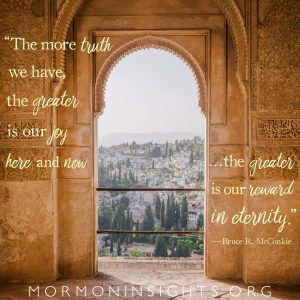When studying Islam in a world religions class, I couldn’t deny the gospel light I found in Muhammad’s teachings—but how was I to reconcile the truth in Islam with my own faith?

Photo by Victoriano Izquierdo
“Try to understand these other faiths,” my world religions professor admonished us on the first day of class. “Through your interfaith experiences in this class, I want you to be able to see what light they have.” As an enthusiastic and involved member of the Church, I was a little skeptical that I would find much truth in other faiths, but I tried to keep my mind open.
While reading over the course syllabus, I saw that my professor had listed the Ensign article “A Latter-day Saint Perspective on Muhammad” by James A. Toronto as a suggested reading. But though the title was intriguing, I didn’t bother reading it because, honestly, the article initially didn’t seem all that useful to me.
In learning more about Islamic scripture and culture, I wondered at the beautiful melody of the Arabic language, the reverent devotion of Muslims to their traditions and practices, and the delicate intricacies of Muslim art and ornamentation. But I wasn’t seeing the light my professor wanted us to discover. Upon assignment, the class read excerpts from the Islamic holy text, the Qur’an. Something I read in 2:177 struck a familiar chord:
“Righteousness is not that you turn your faces toward the east or the west, but [true] righteousness is [in] one who believes in Allah, . . . and gives wealth, in spite of love for it, to relatives, orphans, the needy, the traveler, those who ask [for help]. . . . Those are the ones who have been true, and it is those who are the righteous.”
Muhammad’s teaching of the value of charity and of the spiritual conversion that goes deeper than simple obedience not only sounded familiar, but the principles rang true in my heart. As I read the words I felt the Holy Spirit. I was excited at my experience, but I was also confused. What did this mean for my own faith? Did finding this truth in another religion cheapen the truth of my own beliefs?
In search of guidance, I returned to the Ensign article I had once overlooked, “A Latter-day Saint Perspective on Muhammad.” In it, Toronto shares this teaching of the Prophet Joseph Smith: “One of the grand fundamental principles of ‘Mormonism,’” the Prophet said, “is to receive truth, let it come from whence it may.” The Prophet Joseph Smith exhorted Church members to “gather all the good and true principles in the world and treasure them.”
When I read this, I felt the presence of the Spirit grow and I was reminded that truth and light are given to many people upon the earth, both today and throughout history. Was it so far-fetched to think that Muhammad could have been a recipient of such light and guidance? As members of the LDS Church, we are able to enjoy the full truth and light of the restored gospel, but portions of light still shine through in other faiths as evidence of God’s love for all his children. As I came to understand the light in Muhammad’s teachings, my own faith swelled.
To discover more on faith and interfaith relations between Mormons and Muslims, read James A. Toronto’s article “A Latter-day Saint Perspective on Muhammad.”
Source: Ensign
—Morgan Reese, Mormon Insights
feature image courtesy of pexels.com
Find more insights
Learn how to make interfaith experiences amplify your own faith in Angela Marler Mormon Insights article “When Is Envy a Virtue?”
Discover the similarities between Mormons and Muslims in the Ensign article “Islam and Mormonism—A Comparison” by Latter-day Saint scholar Hugh Nibley.
Read “A Life among Muslims” in the Ensign to learn about the experiences Orin D. Parker and his family had as longtime residents of predominantly Muslim communities.
Check out the 1978 First Presidency statement on God’s love for mankind in R. Lanier Britsch’s Ensign article “I Have a Question” to better understand how other religions function in God’s eternal plan.
Follow the interfaith experiences of fellow Mormons locally and around the world by checking out the Mormon Newsroom webpage topic “Interfaith Relations.”


